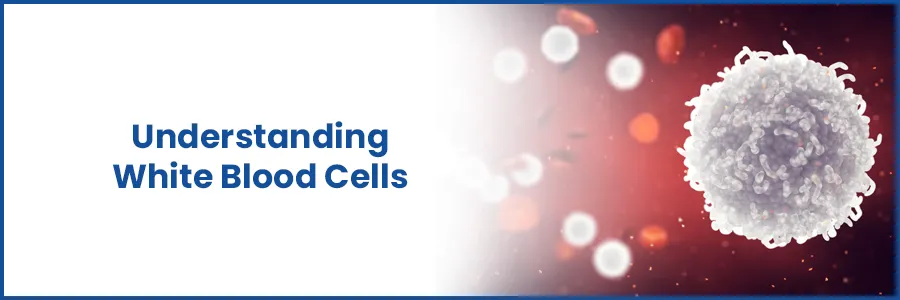- Cardiology 84
- Dermatology 45
- Endocrinology 33
- ENT 16
- Fertility 190
- Gastroenterology 78
- General-Medicine 81
- Gynecology 80
- Hematology 19
- Infectious-Diseases 33
- Neurology 52
- Oncology 34
- Ophthalmology 23
- Orthopedics 69
- Pediatrics 31
- Procedure 23
- Public-Health 144
- Pulmonology 59
- Radiology 8
- Urology 68
- Wellness 161
- Woman-and-child 77

White Blood Cells: Vital for Your Health
White Blood Cells (WBC), often referred to as the soldiers of the immune system, play an essential role in maintaining our health and well-being.
This guide will help you gain a comprehensive understanding of white blood cells, their diverse types, why they matter, and how they actively defend the body against infections and diseases.
What are White Blood Cells?
White blood cells are a type of blood cell primarily responsible for protecting the body from infections and foreign invaders. Unlike red blood cells, they are colourless because white blood cells are a diverse group consisting of several different types, each with its specialised function.
Types of White Blood Cells
- Neutrophils: Fight bacterial infections.
- Lymphocytes: Comprise B and T cells, which are crucial for immunity.
- Monocytes: Engage in phagocytosis, engulfing and digesting foreign material.
- Eosinophils: Target parasitic infections and allergic reactions.
- Basophils: Release histamine and other substances during allergic reactions.
Secure your health with a second opinion. Make informed decisions and book your appointment today!
Get A Second OpinionWhy White Blood Cells Matter?
Understanding the importance of white blood cells extends beyond mere academic interest. They are essential for:
- Infection Control: WBCs are the first line of defence against infections, targeting bacteria, viruses, and other pathogens.
- Immune Response Regulation: They play a crucial role in regulating the body's immune response, ensuring that it is neither too weak nor overly aggressive.
- Healing and Repair: They assist in healing wounds and repairing tissues.
- Cancer Defense: Certain WBCs actively engage in destroying cancerous cells, offering an internal line of protection against malignancies.
How White Blood Cells Work?
White blood cells have an amazing capacity for engagement, removal, and detection.
- Detection: WBCs are continually patrolling the body, looking for foreign invaders.
- Engagement: Once an invader is detected, WBCs will engage it, often by surrounding and engulfing it.
- Elimination: The foreign substance is then broken down and eliminated, with the WBCs standing ready to engage the next invader.
Ready to take control of your health journey? Book your appointment now and start your path towards wellness today!
Book an AppointmentFactors Affecting White Blood Cell Count
Several factors can influence the WBC count in the body, including:
- Diet: Proper nutrition plays a vital role in maintaining healthy WBC levels.
- Exercise: Regular physical activity can enhance immune function.
- Stress: Chronic stress might decrease WBC effectiveness.
- Medical Conditions: Various diseases and treatments like chemotherapy may affect WBC count.
Conclusion
White blood cells are more than just a component of our blood; they are the frontline warriors that keep us safe from infections, diseases, and even cancer. Understanding white blood cells, what they are, and why they matter, is crucial in appreciating the complex and vital role they play in our health.
From their diverse types to their multifaceted functions, white blood cells are an integral part of our well-being. Ensuring a lifestyle that supports healthy WBC levels, through balanced nutrition, exercise, and stress management, will not only enhance your immune function but contribute to overall health and vitality
Frequently Asked Questions
White blood cells are immune system cells that protect the body from infections and harmful substances.
They fight infections by attacking and destroying bacteria, viruses, and other invaders.
There are several types, including neutrophils, lymphocytes (B cells and T cells), monocytes, eosinophils, and basophils.
They are crucial for maintaining immunity, healing wounds, and defending against diseases like cancer.
Infections, medications, autoimmune disorders, and certain cancers can increase or decrease WBC levels.
Yes, a complete blood count (CBC) is a common test that measures white blood cell count and other blood components.

- Cardiology 2132
- Dermatology 168
- Endocrinology 135
- ENT 97
- Fertility 217
- Gastroenterology 232
- General 478
- General-Medicine 1685
- Gynecology 169
- Hematology 85
- Infectious-Diseases 208
- Neurology 207
- Oncology 345
- Ophthalmology 65
- Orthopedics 187
- Pediatrics 83
- Procedure 72
- Public-Health 209
- Pulmonology 126
- Radiology 13
- Second Opinion 311
- Urology 294
- Wellness 600
- Woman-and-child 447
- Others 10217
Related Blogs
If you have any questions, please fill out the enquiry form or call us, and we will get back to you promptly.
040-68334455